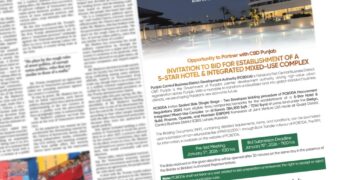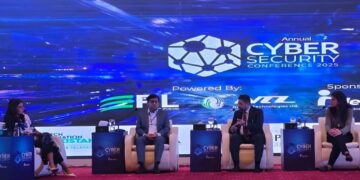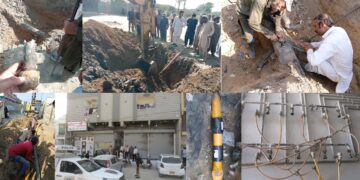KARACHI- Mian Nasser Hyatt Maggo, President FPCCI, called the present ongoing process of managing the way through for the approval of the mini-budget as the most unfortunate situation without consultations with the business community and other stakeholders. It is said that FBR has successfully negotiated the IMF request to raise revenue by Rs. 700 Billion to Rs. 343 Billion. He added that the impact of inflationary taxation on the common man remains only politically debated as for and against without any comprehensive analysis thereof.
On the other side, if the Finance Minister says that the net burden of inflation on the common man is not more than Rs. 2.0 Billion; then what about 341 Billion taxes which are being imposed on the production economy for consumption and for consumers. He further said we would like to know as what exactly the tax expenditure amounts are being imposed on the different sectors encompassing 150 items.
Mian Nasser Hyatt Maggo maintained that he also wonders when he is taking reports from the newspapers that Rs 251 Billion will be refunded/adjusted and therefore only Rs 91 Billion will be passed on to consumers. However, if it is so it negates the assurance of the Finance Minister that only Rs. 2.0 Billion constitute extra incoming inflationary pressure for the common man.
Mr. Maggo said that the imposition of taxes on mechanized tools for improving production and productivity in agriculture is not desirable. He also said that different sectors like Export Processing Zones, Solar and Renewal Energy, and other subsectors need a complete overview for a balanced approach exclusively made by FBR for the imposition of taxes on 150 items:
• The amendment of Customs Act, 1969 (IV of 1969) wherein under section 81, the option of “Corporate guarantee” on provisional clearance of consignments is withdrawn, does not sense to help in ease of doing business. It appears that financial costing instruments are substituted requirements of FBR.
• On the amendments of the Sales Tax Act, 1990, he said that annual turnover of Cottage Industry should have been increased and not decreased from 10 Million to 8 Million Rupees, that circumvent the principles of SME Policy and discourages the business from flourishing from lower levels.
• On the power in respect of change in Third Schedule-[Section 3(2)(a) Proviso] to shift the powers from Federal Government to FBR will leave the business at the mercy of FBR to exercise the powers of Federal Government as and when they would require to make impositions of the indirect taxes, which also apprehends that a new minibudget or budgets are in pipeline by authorizing FBR to exercise powers of Federal Government in respect of imposition of 17% ST charged on taxable supplies and import of goods.
• In respect of amendments on Fifth Schedule (which provides zero-rating of ST on import and supplies), the supplies of manufacturing plant and machinery in the Export Processing Zone at 17% ST cannot be appreciated as the Export Processing Zone remains exclusive to the imposition of any taxes and duties.
• The imposition of ST 17% on goods exempted under section 13, if exported by a manufacturer also will create refund demands beating the concept of no taxes and duties in respect of such exempted exports.• The imposition of 17% ST on preparations suitable for infants, is exclusive to the consideration that the food items deemed to be exclusive of indirect taxation to contain the inflation and affordability.
• The imposition of 17% ST on Bicycles may be a very meager amount reported in taxation expenditure and further it is a common man ride, for which the government may not like to appreciate imposition of ST on Bicycles.
• The imposition of 17% ST on local supplies of raw materials, components, parts, and plant and machinery to registered exporters authorized under Export Facilitation Scheme, 2021 is also not desirable as it infringes upon the very name of export facilitation to import the ease of doing business.
• The imposition of 17% ST on Petroleum Crude Oil will have negative consequences as the import of energy is already under rising global pressures.
• In respect of amendments on Sixth Schedule by withdrawing exemptions from payment of ST on import and supply to 17% ST is also not justified such as imported samples, Import of replacement goods supplied free of cost in lieu of defective goods, Sewing machines of the household type, Imported plant, machinery and materials by Export Processing Zone, Raw materials for pharmaceutical products, Items with dedicated use of renewable source of energy like solar and wind, High Efficiency Irrigation Equipment, Green House Framing and Other Green House Equipment, Plant, machinery and equipment imported for setting up industries in FATA, Appliances and items required for ostomy procedures, Import of plant and machinery for the manufacturing of mobile phones by local manufacturers of mobile phones, Laptop computers, notebooks whether or not incorporating multimedia kit imported, Personal computers, Combined harvesters upto five years old, Fans for dairy farms, Plant and machinery imported by Greenfield industries, Sprinkler, Drip and spray pumps Equipment, Single cylinder agriculture diesel engines, Specified machinery, equipment imported by hospitals and medical or diagnostic, Raw materials imported by registered manufacturer of auto disabled syringes, Items for use with solar energy, Systems and items for dedicated use with renewable source of energy, Specified items for promotion of renewable energy technologies or for conservation of energy, etc.


















